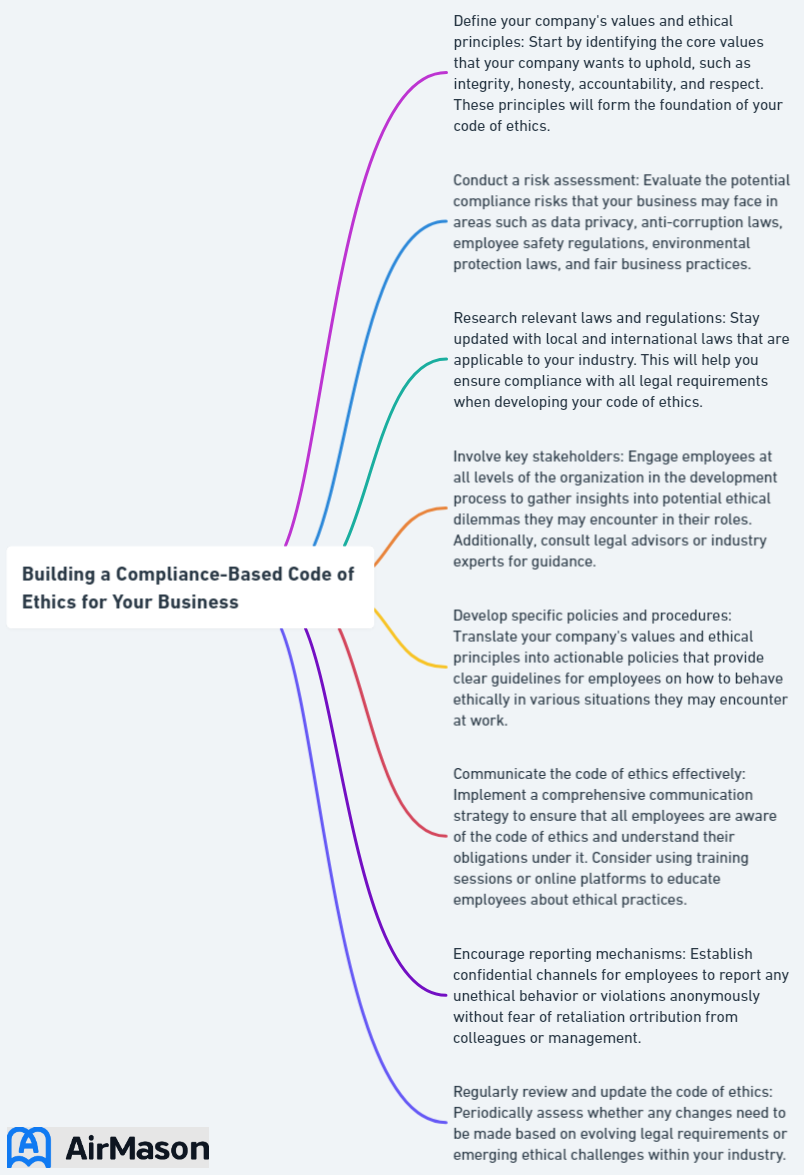
In today’s ever-evolving and complex business landscape, companies face daunting challenges when it comes to maintaining ethical conduct and adhering to legal requirements. But fear not, for we have the perfect solution: a compliance-based code of ethics. Let’s dive into the depths of this essential tool, exploring its key features, pros and cons, and how it compares to the integrity-based alternative. Together, we will navigate the process of developing a compliance-based code, examine its application in different industries, and even discover how to create a hybrid code that harmoniously balances legal compliance with value-based principles. Intrigued? Read on!
Key Takeaways
- A compliance-based code of ethics is a tool to ensure legal compliance and promote ethical behavior.
- It requires precise directives, effective implementation procedures, and appropriate sanctions for adherence.
- Creating a unified code that balances both compliance requirements and organizational values encourages an ethical culture within the organization.
Understanding Compliance-Based Code of Ethics
A compliance-based code of ethics is a powerful instrument, guiding businesses and employees towards adhering to the myriad of state and federal regulations, while simultaneously ensuring exemplary conduct and fostering social responsibility. This set of guidelines delineates specific behaviors expected from employees based on moral principles and outlines penalties for non-compliance.
However, compliance-based codes of ethics aren’t the sole ethical guidelines in the business world. Integrity-based ethics codes emphasize ethical values and principles, rather than strict adherence to legal regulations. Striking an equilibrium between these two methods is often a necessity for numerous enterprises.

Key Features
A compliance-based code of ethics must possess certain fundamental characteristics to be effective. These include precise directives, implementation procedures, and sanctions for non-compliance, setting it apart from its integrity-based counterpart.
The effectiveness of compliance-based codes heavily relies on the enforcement mechanisms. Typical measures include aversive consequences, ethics mechanisms, and the role of a compliance officer to monitor adherence to the code. Moreover, penalties for non-compliance range from fines and prison sentences to damage to the company’s reputation or even closure of the business.
Pros and Cons
While compliance-based codes of ethics offer the undeniable advantage of guaranteeing legal compliance, they may inadvertently place more emphasis on avoiding penalties than encouraging ethical behavior. Furthermore, this approach can fall short in creating an ethical corporate culture, as it may lack comprehensive support from management, foster uncertainty, and diminish trust among employees.
To counter these drawbacks, businesses can supplement their compliance-based approach with integrity-based initiatives, focusing on ethical values and principles to foster a more ethically accountable atmosphere.
Code of Conduct Examples
Code of conduct examples are essential guidelines that outline expected behaviors and principles within a particular environment, organization, or community. These examples serve as a reference point for individuals to understand the acceptable norms, ethical standards, and conduct expected from them in their interactions and activities. For instance, within a workplace, a code of conduct may include guidelines on professional behavior, communication, and respect for diversity. In an online community, it might define appropriate discourse, handling of disagreements, and adherence to community values. By presenting tangible examples, a code of conduct helps maintain a positive and inclusive environment, fostering trust, collaboration, and a sense of shared purpose among members. It sets the tone for a respectful and harmonious coexistence, promoting a culture of accountability and integrity.
Comparing Compliance-Based and Integrity-Based Codes of Ethics

The distinction between compliance-based and integrity-based codes of ethics is far from trivial. The former revolves around specific regulations designed to shield businesses and employees from legal consequences, while the latter sets out business values and moral standards to be observed in daily activities.
Compliance-based codes, for example, often tackle:
- Hiring practices
- Employee remuneration
- Safety and health standards
- Financial reporting and data privacy regulations
Understanding this difference enables businesses to decide between focusing on compliance-based codes for legal safeguards, or adopting integrity-based codes to cultivate an ethical culture aligned with their values and principles.
Compliance-Based Code Focus
Compliance-based codes of ethics concentrate on adhering to legal regulations, preventing violations, and ensuring compliance through punitive measures. Industries and businesses must be cognizant of the legal requirements governing their operations, such as hiring standards, safety regulations, and other pertinent laws and regulations.
Integrity-Based Code Focus
On the other hand, integrity-based ethics programs prioritize the promotion of ethical behavior and aspirational goals over strict adherence to laws and regulations. By emphasizing ethical values and principles, integrity-based codes foster a culture of trust, accountability, and ethical conduct within the organization, enabling employees to make ethical decisions based on their own judgment and moral compass.
Developing a Compliance-Based Code of Ethics for Your Business

Before developing a compliance-based code of ethics for your business, it’s pivotal to define your organization’s ethical vision and ensure it aligns with legal and regulatory requirements.
With a clear vision in mind, the process of drafting a comprehensive code of ethics can be broken down into manageable steps:
- Identifying applicable laws and regulations
- Defining clear rules and guidelines
- Outlining repercussions for non-compliance
- Providing examples and scenarios
- Identifying Legal Requirements
Explicit regulations and clearly defined consequences for non-compliance serve as the foundation of a compliance-based code of ethics. To identify industry-specific legal requirements for drafting a code of ethics, it is essential to:
- Examine each value in the code
- Tailor the code to the particular industry
- Consult relevant industry guidelines and legal frameworks
- Consider the consequences of non-compliance
- Seek input from employees, industry experts, and legal professionals
Drafting the Code

While drafting your ethical code, it’s important to use language that is clear, concise, and easily understood by all stakeholders. The code of ethics should be sufficiently detailed to articulate explicit directives and illustrations of the conduct expected of employees, as well as delineate the penalties for any infringement.
Furthermore, it should incorporate examples of expected behavior, such as adhering to company policies, observing safety regulations, and upholding the rights of others.
Implementing and Enforcing the Code
After drafting your code of ethics, the next step is its implementation and enforcement. This can be achieved through:
- Regular monitoring and audits
- Code of conduct signatures
- Compliance audits
- Testing and monitoring programs
Training is integral to the implementation process, as it serves to:
- Educate employees on the ethical standards and compliance requirements
- Allow employees to make informed decisions
- Enable employees to act in accordance with industry regulations and ethical values.
Privacy and Code of Conduct
Privacy and code of conduct are critical elements that shape the ethical foundations of any organization or community. The integration of a strong privacy policy and a well-defined code of conduct establishes a framework for responsible behavior and respect for individual privacy within the entity. The privacy aspect focuses on safeguarding personal information and ensuring it is handled in a manner that respects individuals’ rights and expectations. Simultaneously, the code of conduct outlines the acceptable behavior and standards of interactions, providing guidelines for fostering a respectful and inclusive environment. Both aspects work in conjunction to create an atmosphere of trust, accountability, and transparency, essential for the sustainable growth and success of any organization or community.
Compliance-Based Code of Ethics in Different Industries

Compliance-based codes of ethics have a wide range of applications across various industries, each with its own unique set of legal regulations and ethical challenges.
Next, we examine the financial and healthcare sectors, both known for their stringent legal regulations.
Financial Industry
Financial industry professionals, such as accountants and financial advisers, must adhere to specific ethical standards and regulations to protect clients and maintain trust while they conduct business. They are required to:
- Comply with laws, rules, and regulations set by regulatory agencies such as the Securities and Exchange Commission (SEC) and FHFA
- Act with honesty and integrity
- Abstain from conflicts of interest in personal and professional relationships
Financial professionals must be aware of the ethical standards and regulations guiding their profession, including the importance of business ethics.
Healthcare Industry
Similarly, healthcare industry professionals must follow strict ethical guidelines and regulations to ensure patient safety, confidentiality, and quality of care. Adherence to specific compliance-based ethics codes, such as the AdvaMed Code of Ethics and the Code of Ethics for Health Care Compliance Professionals, is essential in maintaining ethical standards within the healthcare sector.
Balancing Compliance-Based and Value-Based Approaches

An effective code of ethics achieves a harmonious blend between compliance-based and value-based approaches. By unifying these two paradigms, organizations can formulate a code of ethics that encourages both legal compliance and a strong ethical culture within the organization.
A hybrid code of ethics, which combines elements from both compliance-based and value-based methodologies, is worth considering.
Creating a Hybrid Code
The creation of a hybrid code of ethics requires defining the purpose, compiling a traits list, evaluating relationships, formulating ethical principles, and detailing reporting and enforcement mechanisms.
In essence, this involves developing a code of ethics that encompasses clear guidelines for compliance with laws and regulations while also incorporating values and principles that reflect the organization’s ethical standards.
Encouraging Ethical Culture
Cultivating an ethical culture within an organization is key to the success of any code of ethics. This can be achieved through training, open communication, and rewarding ethical behavior.
Guiding employees to think and act ethically using organizational values, companies can foster an environment where ethical behavior is motivated not just by compliance policy but also by the values integral to the organization’s core.
Business Ethics Example
An illustrative business ethics example involves a company committing to sustainable sourcing practices by ensuring their supply chain adheres to fair labor standards and environmental regulations. For instance, a clothing retailer might actively seek suppliers who utilize ethical manufacturing processes, paying fair wages to workers and employing eco-friendly production methods. This demonstration of ethical conduct not only reflects a sense of corporate social responsibility but also resonates with conscious consumers who prioritize ethical consumption. Furthermore, embracing transparency in financial dealings and avoiding fraudulent practices showcases another crucial business ethics example. This might entail accurate financial reporting, adhering to tax laws, and avoiding misleading investors or stakeholders, upholding trust and credibility in the business realm.
Summary
In conclusion, developing a compliance-based code of ethics is a vital undertaking for any organization seeking to maintain legal compliance and foster an ethical culture. By understanding the nuances between compliance-based and integrity-based codes and striking the right balance between the two, businesses can create a powerful, hybrid code of ethics that not only protects them from legal repercussions but also promotes social responsibility and ethical decision-making. So, armed with this knowledge, go forth and create an ethical foundation that will propel your organization to new heights of success and integrity!
Frequently Asked Questions
What is an example of a compliance-based code of ethics?
An example of a compliance-based code of ethics is the Sarbanes-Oxley Act of 2002, which Congress enacted in response to financial misconduct at Enron and Worldcom, as well as the Code of Professional Conduct from the American Institute of Certified Public Accountants, which focuses on the need for accountants to abide by all applicable laws and regulations.
What is the difference between compliance-based and value based ethics?
Compliance-based ethics are a set of specific rules meant to protect businesses and employees from legal repercussions, while values-based ethics focus on establishing ethical and moral principles that ensure responsible conduct and greater self-regulation. Integrity-based ethics thus require a higher standard of adherence than compliance-based codes.
What is the difference between compliance and ethics code?
Compliance involves mandatory adherence to a law, rule or policy, whereas ethics involves choosing conduct that reflects values of right and wrong.
What are the advantages of compliance-based ethics?
Compliance-based ethics can help create an ethical culture among employees, reduce the chances of workplace lawsuits, and ensure adherence to applicable laws, regulations, and standards. It is an effective way for organizations to make day-to-day decisions that adhere to their business goals while avoiding unethical behavior.
How can a company create a hybrid code of ethics?
A company can create a hybrid code of ethics by combining elements from both compliance- and value-based codes and incorporating legal requirements and their core values.